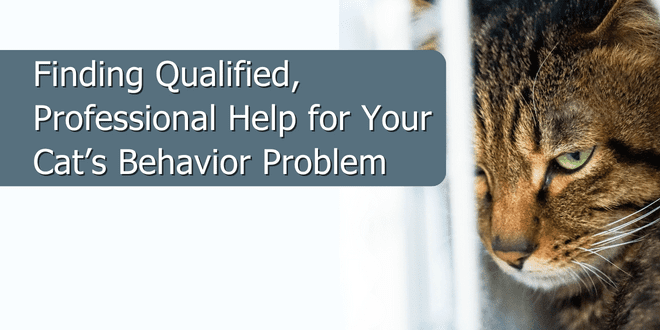 So many people claim to be cat whisperers and have the special talent that enables them to figure out an animal’s mind. True professionals in this field though, make their living based on a sound knowledge of the science of animal behavior. The problem is that in this unregulated field anyone can claim to be a cat expert, cat whisperer, cat therapist, cat psychologist, or cat counselor. Anyone can put up a website, make claims about their expertise and post testimonials but how do you know their expertise is valid? If you’re having a behavior problem with your pet and your family life is in crisis because of it, you may be enticed by claims of “guaranteed” results or lots of testimonials on the website (that may not be real), but a wrong choice may result in making the behavior problem worse.
So many people claim to be cat whisperers and have the special talent that enables them to figure out an animal’s mind. True professionals in this field though, make their living based on a sound knowledge of the science of animal behavior. The problem is that in this unregulated field anyone can claim to be a cat expert, cat whisperer, cat therapist, cat psychologist, or cat counselor. Anyone can put up a website, make claims about their expertise and post testimonials but how do you know their expertise is valid? If you’re having a behavior problem with your pet and your family life is in crisis because of it, you may be enticed by claims of “guaranteed” results or lots of testimonials on the website (that may not be real), but a wrong choice may result in making the behavior problem worse.
Start at the Veterinary Clinic
If you feel you need professional help with a cat behavior problem, how do you go about choosing the right expert? The first place to start is at your veterinarian’s office. I know it doesn’t sound as glamorous as consulting with someone who claims to have some sort of special rapport with cats and ability to “whisper” to them, but many behavior problems can be the result of an underlying medical problem. This happens more often than you’d think. An examination by your veterinarian should be your first step. You’d be surprised how many times a litter box problem is due to a medical issue. I’ve seen lots of cases of aggression as well where the cause turned out to be medical such as periodontal disease, spinal pain, abscess, hyperthyroidism, arthritis, and so on. So don’t skip this step even if you’re convinced the problem is behavioral or your cat may needlessly suffer. If you’ve reached out to a behavior “expert” and that person hasn’t instructed you to visit the veterinarian before setting up a behavior consultation then you need to seek out someone else. A true behavior expert knows it’s important to rule out medical causes first.
When you visit your veterinarian, be as specific as possible about the behavior the cat has been displaying. Sometimes when the veterinarian asks how often the litter box is cleaned the client may be embarrassed and not tell the truth. That doesn’t help the cat and could seriously delay solving the problem. When the veterinarian asks questions give as honest and complete of an answer as you can.
If you record the behavior on your smart phone, that will also help your veterinarian in identifying the next steps needed.
Do Your Homework Before Choosing a Cat Behavior Expert
Behavior training is a powerful tool and if done correctly, is an effective way to change unwanted behavior. Behavior modification is science-based and there’s no magic about it. A trained, professional expert can explain to you how and why the process works and the science behind it. An ethical professional will never guarantee results because much of the success of a behavior plan depends on client compliance and the specifics of the individual case. A qualified professional also won’t give you a promise that all behavior problems can be “fixed” in a short amount of time. Every case is unique. Your neighbor’s cat with the same behavior problem may take twice as long to correct as your cat’s issue.
Look for Qualified Experts With a Track Record
The best way to protect yourself from the multitude of so-called experts is to ask your veterinarian for a referral to a qualified, certified behavior expert. Certified Applied Animal Behaviorists are certified through the Animal Behavior Society. Veterinary Behaviorists are certified through the American College of Veterinary Behaviorists. Certified Animal Behavior Consultants are certified through the International Association of Animal Behavior Consultants. If the expert you’re considering is listed as certified on the website with no reference to a certifying organization, be sure you ask before setting up an appointment.
Anyone can put up a sign or a website and claim to be an expert so the best way to protect yourself is to choose someone who has proven they have documented experience in their field and legitimate credentials. Make sure that person is truly an expert in cat behavior and has a track record involving more more than just shameless self-promotion or lots of gimmicky lingo. Be wary of experts who seem more concerned with selling you products as well. Is the person you’ve chosen recognized by colleagues in the field as a professional? Cats can’t speak for themselves so they’re counting on you to find a qualified professional and not someone who is viewing the current popularity of animal behavior consulting as a ticket to fame and fortune. Those of us who have been in the business for decades know what’s really involved in dedicating our lives to animal welfare. If we were looking for the fast track to fame and fortune, this would not be the chosen career.
Don’t hesitate to ask the behavior professional you’re considering about their background. Is this someone who has demonstrated true expertise in their field or someone who has put up an impressive website and claims to be good with cats because they’ve had many cats in their lifetime? Is website advertising misleading or does it accurately reflect factual information about the professional’s level of expertise? I have come across a few websites with false claims regarding testimonials, staffing, education and even degrees. It breaks my heart for the cats.
Not all experts are certified and some non-certified behavior professionals are excellent at their job. Unfortunately, a vague list of testimonials isn’t a good way to make your decision. If you don’t have a direct referral from your veterinarian, another professional in the animal field, or someone else you trust, the safest route is to choose a veterinary behaviorist, certified cat behavior consultant, or a certified applied animal behaviorist.
What to Expect During Your Cat Behavior Consultation
- You should feel comfortable talking with the behavior expert and also be comfortable with the proposed behavior plan. In order for a behavior plan to be successful, it must fit your abilities, schedule, and lifestyle. A qualified professional will work with you to establish a customized plan to fit you and your cat. There is no one-size-fits all behavior plan.
- The behavior expert should provide an explanation of why the proposed behavior plan is being chosen and the science behind it. Unless the behavior expert is a licensed veterinarian or veterinary behaviorist, no medical diagnosis should be made and no drug recommendations should be given.
- Whether you’re doing an in-home consultation, in-clinic consultation, or virtual consultation, you will need to fill out a detailed behavior and medical history questionnaire. Even if a question on the form doesn’t seem relevant, fill out the form to the best of your abilities to help the behavior professional put all pieces of the puzzle together. You may also be asked to provide pictures or videos to help the behavior professional get a more accurate idea of the behavior being displayed. If you do a virtual consultation, you may be asked to provide a video walk-through of the home setting and maybe even provide a basic floor plan sketch. When I do remote sessions I ask for a floor plan sketch that includes identifying locations of litter boxes, feeding stations, favorite napping areas, each cat’s preferred territory, and places where any problems had occurred. I also request a video walk-through and any videos available that captured the behavior problem. Having the videos and the floor plan make a difference in helping me get a feel for what is going on in the home.
- Many behavior professionals provide a written client report to make it easier for you to remember all the steps involved in the behavior plan. It’s also a good idea for you to take notes during the session or even record the consultation (ask the behavior professional for permission before recording).
- There should be a scheduled follow-up with the behavior professional. Some experts may have an additional fee for follow-up appointments but you should be able to contact them with any questions or concerns.
- The behavior expert may send a follow-up report to your cat’s veterinarian to place in the records. This report will also help the veterinarian to follow up on progress made when your cat returns for an exam.
Your Responsibility
Remember to communicate with the behavior professional. I know it’s easy to get busy and forget to follow up on things but if the behaviorist asks for a follow-up call in a particular time-frame, put it on your calendar so you don’t skip it. This follow-up is important so the behaviorist can make sure you are following the instructions correctly and the cat is responding well.
Compliance is important. The plan provided to you is given for a reason and it requires you to do the daily work needed to help your cat through the behavior problem. Behavior experts don’t have a magic wand they can wave over your cat to instantly correct an unwanted behavior. Behavior modification requires consistent sessions of you working with your cat. The daily requirement isn’t time consuming but it is important to be consistent and follow through with the homework given to you. The cat can’t do the behavior work alone; your participation and guidance are needed for success.
Need More Information?
For more information on cat behavior and training, check out the best-selling books by Pam Johnson-Bennett. Pam’s books are available at bookstores and online. We’ve also included Amazon links here on our website.
If you have a question regarding your cat’s health, please contact your veterinarian. This article is not intended as a replacement for your cat’s veterinary care.


